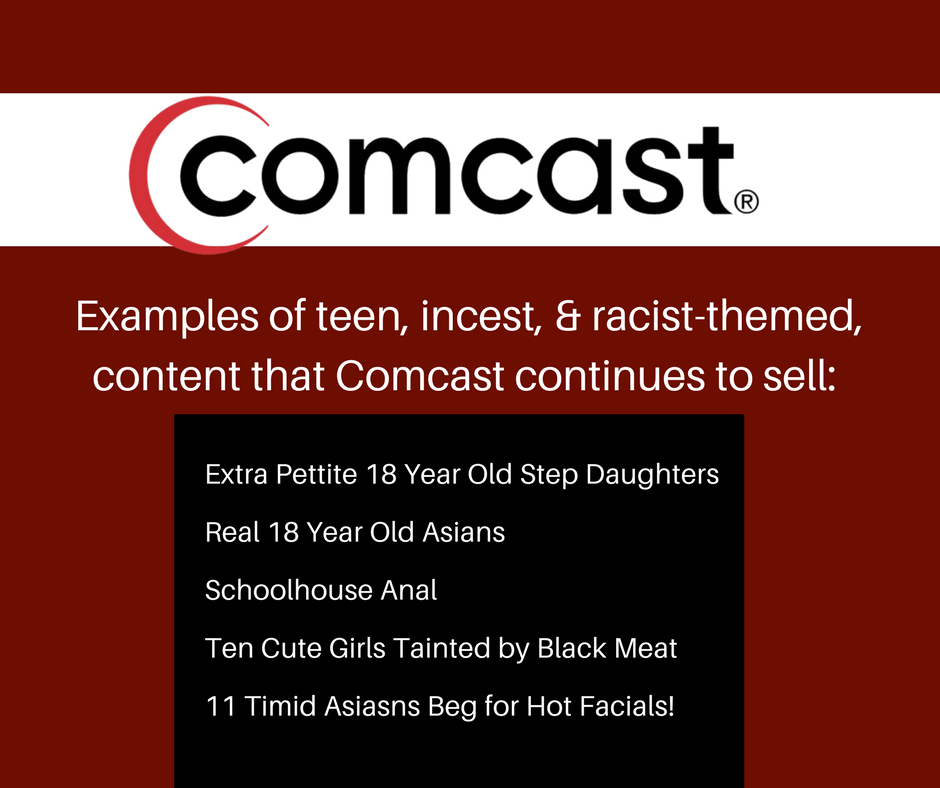Trigger warning: image included which lists names of pornography titles being sold by Comcast. There are no hypersexualized or nude images, only words.
In today’s #MeToo culture, where sexual harassment and assault are rampant, corporations like Comcast have a renewed corporate responsibility to refrain from facilitating or profiting from material that promotes sexual exploitation.
However, Comcast is filled with hardcore pornography that supports rape myths, normalizes adult-with-teen-themed and incest-themed exploitation, and reinforces degrading racially charged sexual stereotypes.
The National Center on Sexual Exploitation (NCOSE) has publicly announced its annual “Dirty Dozen List” which names major mainstream promoters of sexual exploitation in America. Comcast is on this list again in 2018 alongside companies like Backpage.com, a notorious sex trafficking website.
Responding to Mr. Cohen Regarding Potentially Obscene and Illegal Content on Comcast
In a letter to NCOSE dated February 27, 2017, Mr. David L. Cohen, Senior Executive Vice President at Comcast, stated that he rejected our characterization of Comcast on the 2017 Dirty Dozen List regarding our concern that the material Comcast sells may be unlawful.
Federal law prohibits the distribution of obscene adult pornography on the Internet, on cable/satellite TV, on hotel/motel TV, in retail shops, through the mail, and by common carrier. Specifically, 18 U.S.C. 1468 prohibits the distribution of obscene matter by cable or satellite TV.
You can download our fact sheet on obscenity law here.
First, Mr. Cohen stated that Comcast has contractually bound with the pornography industry that any content given to Comcast should be lawful. Unfortunately, the pornography industry is likely not a reliable source for legal advice as compared to codified law, particularly considering their vested financial interests in partnering with Comcast.
Second, Mr. Cohen stated that Comcast is in compliance with the “Adult Content Standards” set forth by the Cable & Telecommunications Association for Marketing (CTAM). While CTAM may provide useful guidelines for Comcast on different matters, CTAM operates as a non-profit association and is therefore outranked by the Supreme Court decision which upheld obscenity laws.
Obscenity is not within the area of constitutionally protected speech or press – in Roth v. United States, 354 U.S. 476 (1957), Justice Brennan observed that “this Court has always assumed that obscenity is not protected by the freedoms of speech and press” (at 481). In Roth, the Supreme Court went on to hold that obscenity is “not within the area of constitutionally protected speech or press” (at 485).
More recently, in Ashcroft v. ACLU, 535 U.S. 564 (2002), the Supreme Court rejected a constitutional challenge to the application of obscenity laws to the Internet. See also, United States v. Extreme Associates, 431 F.3d 150 (3rd Cir. 2005), cert. den., 547 U.S. 1143 (2006).
Regarding Comcast’s Facilitation of Sexual Exploitation Through Pornography Sales
Our society is struggling to cope with the impacts of multiple forms of sexual abuse and violence: child sexual abuse (which is 167 times more common than autism),[1] adult sexual exploitation,[2] racially-motivated sexual violence,[3] sexual assault on college and university campuses,[4] sexual trafficking of women and children,[5] and incest[6] to mention a few.
Comcast is promoting and profiting from pornography based on all of these themes.

Comcast has informed NCOSE that they will be creating deceptive movie titles and descriptions that attempt to sanitize the degrading and exploitive themes of the films. This is far from a solution. Comcast will still be selling and profiting from pornographic content such as those described below which have been found on Comcast, but will not be alerting viewers to the true nature of the content they are about to view.
As a wealth of peer-reviewed research demonstrates, pornography is linked to a multitude of harms, and particularly sexual violence against women, including sexual harassment and rape.
A recent meta-analysis of 22 studies from seven countries provides clear evidence confirming that pornography exposure is associated with sexual aggression in the United States and internationally, among both males and females; associations are stronger for verbal than physical sexual aggression, but both are significant.[8] As the authors state, “the accumulated data leave little doubt that, on the average, individuals who consume pornography more frequently are more likely to hold attitudes conducive to sexual aggression and engage in actual acts of sexual aggression than individuals who do not consume pornography or who consume pornography less frequently.”[9]
In light of the #MeToo and Times Up movement, will Comcast continue to support the systemic sexual exploitation of pornography, including its graphic themes of violence, racism, and incest?
Take Action and Email Comcast By Filling Out the Form Below, or Click Here To Tweet at Comcast
